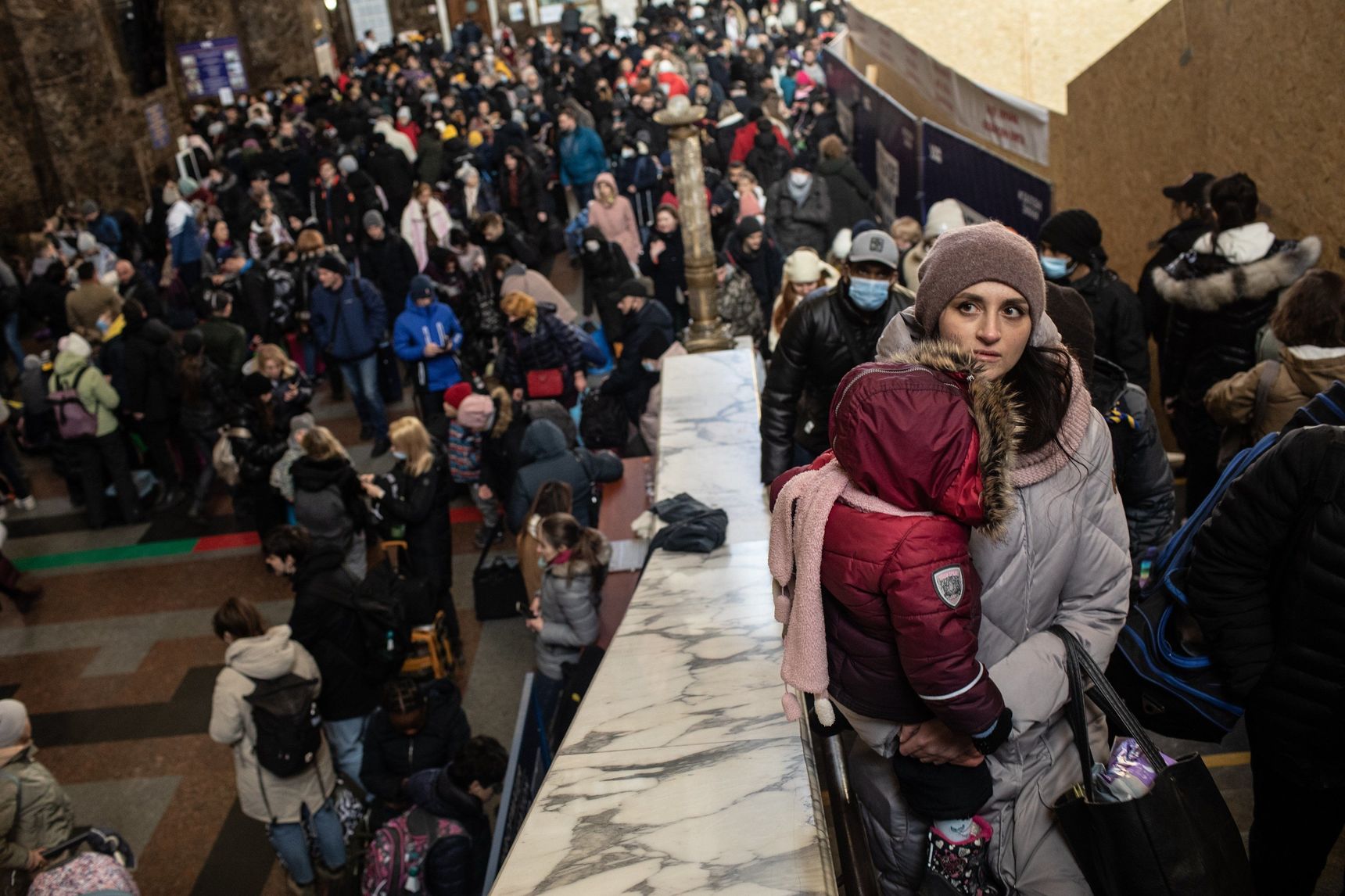How Bitcoin and a Crypto Exchange Became Part of Ukraine’s War Effort
Kuna, Ukraine’s largest crypto exchange, has emerged as central hub for the country’s efforts to raise funds via cryptocurrencies.
The founder of Ukraine’s largest cryptocurrency exchange, Kuna, has been sleeping only a few hours a day since Russia invaded his country.
Trading of cryptocurrencies on Kuna has jumped since the war began. The surge is, in part, a consequence of strict capital controls implemented by the Ukrainian central bank: limits on ATM withdrawals, restrictions on the country’s official electronic-currency system and suspension of the foreign-exchange market. But cryptocurrency and Kuna are also providing a vehicle for outsiders to donate to Ukraine, raising funds for the government and relief efforts.
Michael Chobanian is operating Kuna from the western part of Ukraine after leaving Kyiv. He said he had moved his staff and the exchange’s infrastructure outside the country before the invasion. Mr. Chobanian spoke to The Wall Street Journal via recorded messages to save time. At the moment, everything is being done in an ad-hoc fashion.
“That’s the reality I have to live in,” Mr. Chobanian said.
The Ukrainian government and private aid groups have raised about $51 million in crypto from more than 89,000 donations since the invasion started last week, according to the analytics firm Elliptic. Most of that has been coordinated by Mr. Chobanian and Kuna.
On Kuna’s landing page for a fund it set up to accept donations, it says: “Let’s stop the war. Let there be peace. In crypto we trust, for Ukraine we pray.”
The crypto donations have helped finance military equipment, medical supplies and other goods, Elliptic said.
While activists, politicians and even terrorist groups have used cryptocurrencies to raise funds in recent years, it has never been done by a national government, said Tom Robinson, the co-founder of Elliptic.
The amounts aren’t large compared with other funding sources—the Biden administration proposed sending $6.4 billion in aid and Ukraine raised $270 million in bonds on Tuesday to help fund its war efforts—but it shows that crypto has a role to play, he said.
“It demonstrates that money can be raised directly from individuals around the world, for humanitarian aid, or to directly fund a war,” said Mr. Robinson.
Leaning on technology isn’t out of character for the Ukrainian government, which has been trying to boost its economy with the technology industry in recent years. The country launched an official government-based system of electronic money and created a Ministry of Digital Transformation. It was that ministry that asked Kuna to start the crypto fundraising effort, Mr. Chobanian said.
“Cash is useless because it’s physical,” Mr. Chobanian said. Carrying cash is also dangerous in a war zone, he said.
Most people, he said, are using credit cards or IBAN, the international bank account number system used by banks. Cryptocurrencies work well for large payments and international payments, Mr. Chobanian said.
Crypto transfers are especially fast compared with traditional methods. Transactions settle in about 10 minutes for bitcoin, for example, after which the money is transferred. What that means in practice is that the money being donated is available almost immediately.
Kuna converts crypto into other digital currencies or fiat currencies for bank accounts. Some of the supply companies for which Kuna is brokering the purchases, Mr. Chobanian said, are accepting payments directly in crypto. In some cases, they have walked the companies through the steps to do so.
“Because a lot of companies want to help us more than make money, they start accepting crypto for us,” Mr. Chobanian said.
The donation fund accepts a range of cryptocurrencies: bitcoin, ether, tether, litecoin, dogecoin and about 20 others. Gavin Wood, the founder of one blockchain-based platform called Polkadot, tweeted that he would donate $5 million if they set up a Polkadot address. Mr. Chobanian did a few hours later. Mr. Wood made the donation.
The Ukrainian government alone has raised $31.5 million in crypto donations and spent $17 million of it so far, according to an update Wednesday Mr. Chobanian shared on his Twitter account.
Ukrainian and U.S. officials have voiced concerns that Russians could use cryptocurrencies to evade sanctions. Over the weekend, Ukraine’s Vice Prime Minister Mykhailo Fedorov asked crypto exchanges to block Russian users, something none of the exchanges agreed to do. So far there hasn’t been evidence supporting a large-scale Russian effort to avoid sanctions using cryptocurrencies.
 Copyright 2020, Dow Jones & Company, Inc. All Rights Reserved Worldwide. LEARN MORE
Copyright 2020, Dow Jones & Company, Inc. All Rights Reserved Worldwide. LEARN MORE
This stylish family home combines a classic palette and finishes with a flexible floorplan
Just 55 minutes from Sydney, make this your creative getaway located in the majestic Hawkesbury region.
Continued stagflation and cost of living pressures are causing couples to think twice about starting a family, new data has revealed, with long term impacts expected
Australia is in the midst of a ‘baby recession’ with preliminary estimates showing the number of births in 2023 fell by more than four percent to the lowest level since 2006, according to KPMG. The consultancy firm says this reflects the impact of cost-of-living pressures on the feasibility of younger Australians starting a family.
KPMG estimates that 289,100 babies were born in 2023. This compares to 300,684 babies in 2022 and 309,996 in 2021, according to the Australian Bureau of Statistics (ABS). KPMG urban economist Terry Rawnsley said weak economic growth often leads to a reduced number of births. In 2023, ABS data shows gross domestic product (GDP) fell to 1.5 percent. Despite the population growing by 2.5 percent in 2023, GDP on a per capita basis went into negative territory, down one percent over the 12 months.
“Birth rates provide insight into long-term population growth as well as the current confidence of Australian families,” said Mr Rawnsley. “We haven’t seen such a sharp drop in births in Australia since the period of economic stagflation in the 1970s, which coincided with the initial widespread adoption of the contraceptive pill.”
Mr Rawnsley said many Australian couples delayed starting a family while the pandemic played out in 2020. The number of births fell from 305,832 in 2019 to 294,369 in 2020. Then in 2021, strong employment and vast amounts of stimulus money, along with high household savings due to lockdowns, gave couples better financial means to have a baby. This led to a rebound in births.
However, the re-opening of the global economy in 2022 led to soaring inflation. By the start of 2023, the Australian consumer price index (CPI) had risen to its highest level since 1990 at 7.8 percent per annum. By that stage, the Reserve Bank had already commenced an aggressive rate-hiking strategy to fight inflation and had raised the cash rate every month between May and December 2022.
Five more rate hikes during 2023 put further pressure on couples with mortgages and put the brakes on family formation. “This combination of the pandemic and rapid economic changes explains the spike and subsequent sharp decline in birth rates we have observed over the past four years,” Mr Rawnsley said.
The impact of high costs of living on couples’ decision to have a baby is highlighted in births data for the capital cities. KPMG estimates there were 60,860 births in Sydney in 2023, down 8.6 percent from 2019. There were 56,270 births in Melbourne, down 7.3 percent. In Perth, there were 25,020 births, down 6 percent, while in Brisbane there were 30,250 births, down 4.3 percent. Canberra was the only capital city where there was no fall in the number of births in 2023 compared to 2019.
“CPI growth in Canberra has been slightly subdued compared to that in other major cities, and the economic outlook has remained strong,” Mr Rawnsley said. “This means families have not been hurting as much as those in other capital cities, and in turn, we’ve seen a stabilisation of births in the ACT.”
This stylish family home combines a classic palette and finishes with a flexible floorplan
Just 55 minutes from Sydney, make this your creative getaway located in the majestic Hawkesbury region.






















